
Mycle Schneider, a Paris-based consultant on energy and nuclear policy, received the Right Livelihood Award in 1997 for “serving to alert the world to the unparalleled dangers of plutonium to human life.” Democracy Now! interviewed him during the 30th anniversary of the Right Livelihood Award in Bonn, Germany in 2010.
From 2006 to 2007, Mycle Schneider was part of a consortium of consultants that assessed nuclear decommissioning and waste management funding issues on behalf of the European Commission. In 2007, he was appointed to the International Panel on Fissile Materials (IPFM), based at Princeton University, and joined the Independent Group of Scientific Experts (IGSE) on the detection of clandestine nuclear-weapons-usable materials production. He has lectured extensively on four continents, including at Carlton University, Ottawa (Canada), Tsinghua University (China), Ecole de Commerce, Rouen (France), Freie Universität Berlin (Germany) and Ritsumeikan University, Kyoto (Japan).
MYCLE SCHNEIDER: My name is Mycle Schneider. I work as an independent consultant. I work on energy policy and nuclear policy, in particular. I’m based in Paris, where I’ve been living for 30 years. And I think energy is a real crucial issue; that’s not really new. It’s been a crucial issue, I think, for a long time, without maybe having gotten the attention it should have been getting. And I’ve been interested, like 28 years or whatever ago, in this issue because it’s central to power. So, the connection between, you know, energy use, production and political power, I think, is very central. It’s central to this world now, and it’s been central to what’s going on in this world for a long time.
AMY GOODMAN: You did a World Nuclear Industry Status Report looking at the state of nuclear, what, power and weapons in the world?
MYCLE SCHNEIDER: The World Nuclear Industry Status Report really is on the industry, so it’s really only focusing on the nuclear power industry, not on nuclear weapons. The basic idea came actually in the early ’90s. Like the first World Nuclear Industry Status Report, we published with Worldwatch Institute in Washington and Greenpeace International. And it was at the time when we were still operating with a small group called WISE-Paris in France, as the name indicates. And the idea was, at the time, to illustrate that at the end of ’80s the nuclear power industry has actually reached a peak.
And it’s very interesting, you know, to look back. I think this kind of analysis needs very long time periods. For example, if you look at statistics on energy over the last two years, it won’t tell you anything, because the economic crisis has distorted entirely statistics. So you don’t know what’s policy, you don’t know what’s economic crisis. It’s extremely complex to identify. So, I’m always saying, you’ve got to look at the film. Don’t look at the photograph. Look at the film in order to understand what’s happening. And the film, you need, you know, quite a long period of time to look at in order to really understand.
And so, if you do that, from the late ’80s until today, you realize we weren’t actually wrong. It peaked. It was like the first time that there was an interruption in the, you know, steadiless increase of numbers of units operating. And since then, it has [been] vacillating, sort of. You know, it’s just been like less than 20 units net that were added. And what we identified in the last report—and this report, interestingly enough, was commissioned by the German government. This was like, for the first time, not like an NGO-commissioned or foundation-commissioned work, but a government-commissioned work. And what we identified, basically, was that the entire talk about this revival or renaissance, whatever the names are that are being used, is gigantic hype. It’s maybe—to me, it’s a scam on the order of magnitude of the Gulf War. It’s like a hoax. I mean, it’s just a gigantic, artificial, created white elephant.
AMY GOODMAN: You’re saying that the nuclear power uses, nuclear energy, are not going up.
MYCLE SCHNEIDER: No, in fact, you know, for the first time in nuclear energy history, in 2008, there was no—not a single nuclear new reactor connected to the grid in the entire world.
AMY GOODMAN: And yet, you have the United States now, President Obama, getting re-interested in nuclear power and commissioning for the first time in 30 years in Georgia two new power plants.
MYCLE SCHNEIDER: That’s not quite correct. The Obama administration has supported a new energy bill which would increase loan guarantees and essentially triple them from $18.5 to $54 billion U.S. dollars, which is a lot of money. But President Obama does not order nuclear power plants. Obama can, you know, submit a bill, a draft bill that has to get voted. It’s not voted yet.
So, the situation we have, it’s like the previous administration was even more pro-nuclear than the current administration. What did they do? They started a program that was called Nuclear 2010, which said that, at the very least, two nuclear power plants—new nuclear power plants were to be connected to the grid by 2010, thus the name Nuclear Energy 2010. Well, that didn’t happen. More so, there is not even a single new nuclear power reactor under construction in the U.S.
Oh, I should be precise. There is one reactor under construction. That’s Watts Bar 2. Indeed, it was started, constructing, in 1972. And it’s supposed to go online in 2012. And I’m not so sure that an industrial facility that has been under construction over 40 years, if it goes online in 2012, is really a model for some kind of a revival of nuclear power.
AMY GOODMAN: Why did you get so interested in nuclear energy and, well, for a long time, it was specifically plutonium?
MYCLE SCHNEIDER: Well, originally, I’m a war resister. So I’m actually coming out of the antiwar and anti-militaristic movement. I’m a conscientious objector, and I was very interested when—
AMY GOODMAN: What did you object to?
MYCLE SCHNEIDER: Well, we had a draft in Germany, so I objected to military service.
AMY GOODMAN: When?
MYCLE SCHNEIDER: In 1977, around, late ’70s.
AMY GOODMAN: And what would you have been drafted to fight?
MYCLE SCHNEIDER: Oh, military service. So—and we always made it very clear. It’s not about the 18 months or whatever time scale that was at the time of service. We were war resisters. And if you’re a war resister, it doesn’t make sense to be trained for war, isn’t it? So, at the time, there was then, if you—we went through a kind of a consciousness exam, which I think was quite unique in the world in that kind of—instrumentalized, you know, who could pretend to examine the consciousness of somebody else? However, they had these juries that did that, and I had to pass that kind of exam as a conscientious objector.
And then I did my civil service working with elderly people for a year and a half. And then I traveled and had another part of my life, a previous life. I did theater, music, all kinds of things. And I got stuck in Paris. Paris is a good place to get stuck if you’re into arts. But I also was very much active in the—I continued to be active on military issues. And I was trying to sort of profit of the situation being in another country, trying to provide information to the country I came from. There’s a language barrier which I could, you know, get over. And so, I started writing. Those were my first journalistic products, if I may say so, were an article about conscientious objection in Germany that I published in France, and vice versa. And ever since, I’ve been doing journalistic work.
So when I did this kind of research into military nuclear issues, you necessarily come through the analysis of military—the civilian-military link. And it’s obvious. If you do your homework, you will discover this one day or another. And it got more and more clear to me that the essential thing was actually the energy side, because the military side was sort of drying out, right? And into power terms, you have the military establishment, but you have the political general establishment. And all these things were very intimately linked to centralized decision making. And I thought this was a very, you know, potent issue. And it was a very important issue. Living in France, you know, I was amongst a very small number of people that had a sort of independent view and independent perspective on these issues. That’s when I—when it all started.
AMY GOODMAN: The Right Livelihood Award Foundation said they gave you the award “for serving to alert the world to the unparalleled dangers of plutonium to human life.” Could you just explain what plutonium is and why it came down to plutonium for you?
MYCLE SCHNEIDER: Yeah, I think that there is a nuclear issue, and there’s a plutonium issue. I mean, those are two different dimensions of the same story. And I think it’s two different dimensions because you can go nuclear without going plutonium, to a certain degree. Like, you can say plutonium is generated in every nuclear reactor that operates with uranium, which is all of the commercial reactors in the world. Normal operation of a nuclear reactor will always generate plutonium, and “normal” as a normal byproduct.
Now, plutonium is not just any substance. It’s a very particular substance. It’s a substance which has basically two essential characteristics. One, it’s extremely radiotoxic. So, you might have a scientific debate whether 12 or 90 hundredth—millionths of a gram, micrograms, are lethal. I don’t think those scientific debates make much sense. It’s extremely radiotoxic.
On the other hand, you know, it needs a very small amount—like, if it’s in a pure form, it needs maybe two kilograms, maybe two and a half, to make a nuclear explosive device. So there’s two totally different areas where the substance is quite exceptional. Many people don’t know, but the U.S. government has tested out a uranium weapon in Hiroshima and a plutonium weapon in Nagasaki. And so, a few kilograms. When we are talking about a critical mass of plutonium that is a Nagasaki-type effect, we’re talking about this kind of size. This is very small to kill 80,000 people, isn’t it?
AMY GOODMAN: You’re just holding up your hands in a ball about, what, four inches in diameter.
MYCLE SCHNEIDER: Yeah, it’s stunningly small, and it’s—so, you know, to control substances that we—today we create—not only we create in nuclear reactors, but we actually separate in so-called reprocessing facilities. And we store, and some of it is reused. But we have a huge problem of military stockpiles of plutonium, on one hand. On the other hand—which don’t move anymore, because the major powers don’t generate more. And on the other hand, we create so-called civil plutonium, which is—I mean, the difference is very minor, really, and it continues to increase. And actually, the so-called civil stockpile has now, most likely, bypassed the military stockpile. So it’s a very significant problem.
AMY GOODMAN: And one can be transformed into the other?
MYCLE SCHNEIDER: One absolutely can be transformed into the other. And you can make use of so-called civil plutonium. That’s why I’m always saying “so-called.” It’s nonsense. It’s perfectly possible to fabricate a military—an explosive device with so-called civil plutonium.
Now so, the work we did was—with my Japanese colleague and close friend—was kind of—and I think that it was recognized by the jury of the Right Livelihood Award. It was a unique partnership, because it was transcultural. This man was famous as a writer. He published 58 books in his lifetime. He was a very fine nuclear chemist and scientist. I’m not.
AMY GOODMAN: Jinzaburo Takagi.
MYCLE SCHNEIDER: Jinzaburo Takagi, a very extraordinary person and scientist. And so, we started working together, and I think this partnership—we completed each other in a quite extraordinary way. And he had his sphere of influence and ways of working, and I had mine. And we put the two together. And it was—I think we had some effects.
AMY GOODMAN: Do you think the world is headed toward—more toward peace or war in this last decade?
MYCLE SCHNEIDER: Well, that’s very difficult to—you know, what do you call “peace”? What do you call “war”? In my opinion, it’s when a society is not able to provide heat in the winter to people, and they die, because they can’t afford to heat their homes. This is war on people. It’s all about, you know, how you define “war.”
But we’re back to the kind of—you know, why is energy so important? And I think this is the typical example, you know, where the services provided—energy services that are provided are not at all appropriate for people’s needs. And this is not what current—the current approach to energy policy is about. We’re talking about barrels of oil or about kilowatt hours or about cubic meters of natural gas. All this is nonsense. What people need is the service that comes out of the transformation of the energy carriers. So, we’re talking about light. There’s lots of light here. We’re talking about communication. That’s what we’re doing. We’re talking about cold and heat, and we’re talking mobility and motor talk. But those are—that’s what it’s all about. But that’s not how policy is designed. Policy is designed about barrels of oil and kilowatt hours. So we’ve got to get off that. And the reason that it is still linked to energy sources or resources is very much linked to power.
AMY GOODMAN: Thank you very much.
MYCLE SCHNEIDER: You’re most welcome.
AMY GOODMAN: Thanks.

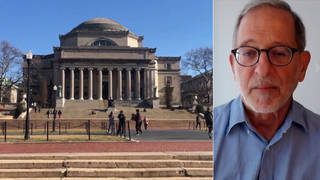
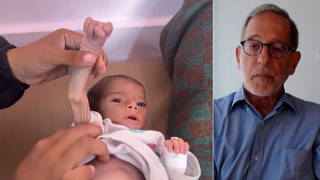
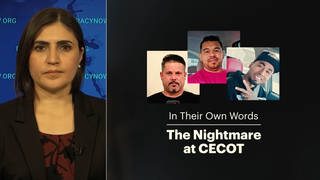
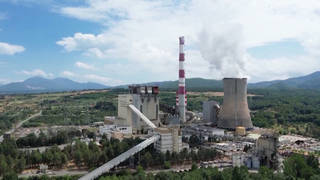





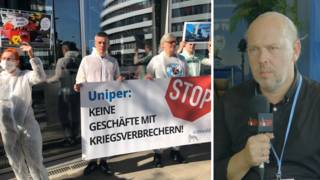

Media Options